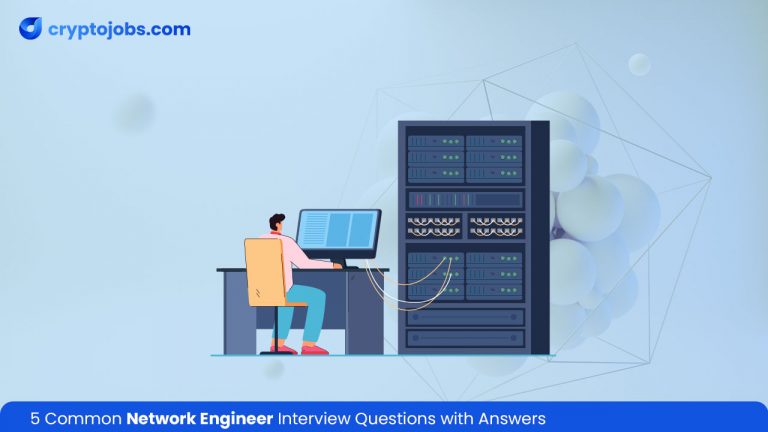
5 Common Network Engineer Interview Questions with Answers
- cryptojobs.com
- November 20, 2024
- All Posts, Interview Questions
- 0 Comments
The network engineering field is continuously evolving, owing to technological advancements occurring almost every day. This has led to the emergence of a great number of career opportunities for network engineers, giving them the chance to flourish and reach their maximum potential.
However, as the digital era advances, web3 companies seek skilled professionals who know network engineering inside and out. Recruiters expect these tech-savvy professionals to demonstrate everything from the necessary basic education to expert knowledge. To test a network engineer’s knowledge and expertise, recruiters ask a few questions during the interview. The answers you give will determine what you know about the field and to what extent.
Given below are five common network engineer interview questions and their appropriate answers that will help you make the right impression and boost your chances of success.
Are you a talented professional looking to find your dream network engineering job in the web3 industry? Look no further; register with cryptojobs.com today to find the most sought-after opportunities.
How Do You Organize Multiple Networking Projects Effectively?
In this question, the interviewer is trying to assess if you can work on multiple projects and how well you can manage them. They want to see if you can prioritize projects correctly and allocate time to each.
Here is an example answer:
“A skilled, successful Network Engineer must possess excellent organizational skills to be able to handle multiple projects at any given time. The project management skills I have acquired over time enable me to set clear goals and objectives, depending on the priority of each project.
I have worked on multiple projects several times, so I will consider each project’s timelines and necessities by visually having everything planned and organized. This way, I will always have reminders of critical tasks, deadlines, and follow-up areas.”
A similar job that you might be interested in is Network & Security Engineer. You can apply here: https://www.cryptojobs.com/job/senior-network-security-engineer-4403
What Process Do You Follow When Troubleshooting a Network Issue?
It is essential for a network engineer to follow a logical, thoughtful process when tackling network challenges. Here, the recruiter evaluates how well you can troubleshoot an issue and what methods you typically utilize.
They want to see if you opt for an updated and reasonable system or an outdated one while identifying the problem’s cause. Additionally, your analytical, creative, and critical thinking skills are being checked, as well as how well you use them to derive all possibilities and variables.
Here is an example answer:
“My professional experience has taught me to take a logical, smart approach when troubleshooting network problems. I try to reach the root cause of an issue and then develop a rational theory about why it may have occurred. Next, I apply the most suitable solution by implementing a procedure or code. For instance, I keep making adjustments until I pinpoint the exact issue and its solution. Once the problem is resolved, that is when I am fully satisfied with my efforts.”
Describe Your Project Management Experience in Network Engineering.
Senior or experienced network engineers are mostly expected to handle projects right away. This question aims to inquire about the network engineer’s management skills in different types of projects. Can they work independently, in a team, or both? The answer should also include how you utilize your interpersonal skills when working as a team.
The interviewer expects you to give a practical answer that highlights your organizational and management skills. They want realistic details – project planning, deadlines, time to tackle problems, safety nets, etc.
Here is an example answer:
“Anytime I design or implement a new project, I am fully dedicated to its success. I ensure that I am fully immersed in the project, looking into its most trivial details, as these are what can lead to greater problems later on. I have developed familiarity with numerous project management software (add examples if necessary) and ways I can present project proposals formally.
While managing projects independently is liberating, working in a team gives you the opportunity to interact and learn valuable lessons from professionals from diverse backgrounds, which ultimately adds to your skillset. I recall a project very clearly because of the brilliant team I had. It included… (project details)”
Explain The Significance Of Encryption On A Network.
While this question may seem simple, it tests multiple skills. Here, the interviewer is trying to gauge your knowledge regarding basic mathematics, programming languages, encryption tools, encryption standards, analytics, and ethics.
They want to know if the interviewee understands the fundamental process of encoding information—how it is coded to make the core information unintelligible or inaccessible to unauthorized users. Once in intended, safe hands, the information is decoded or decrypted back to a readable, normal format using a secret password or key. With this question, recruiters analyze whether you comprehend the essence of encryption.
Here is an example answer:
“For me, a comprehensive understanding of encryption is among the most important fundamentals of network engineering. Maintaining customer confidentiality and company privacy is substantial in all professions, which is why I emphasized learning about encryption.
It is basically a process that allows a network engineer to make data unreadable or unintelligible and protect it against unauthorized access. I usually use encryption by transforming a certain piece of information into a code and then decoding or decrypting it later on when needed. That ensures data integrity, privacy, and compliance.”
A similar job that you might be interested in is Staff Network Engineer. You can apply here: https://www.cryptojobs.com/job/staff-network-engineer-platform-4412
What Are Proxy Servers, and How Do They Protect Computer Networks?
With this question, the interviewer assesses whether you are fully aware of the importance of proxy servers or if you have merely read the definition online. They want to know if you understand how proxy servers work and what happens if they collapse.
The recruiter also wants to see if you mention anything about adding a proxy server to your projects, which ultimately is the company’s project. Consider including the basic purpose of a proxy server in your answer, along with the components that make a good proxy server.
Take a look at this example answer:
“Proxy servers should be given a lot more importance than we usually do. Considering how exposed we are to various viruses and cyberattacks currently, installing a proxy server into your system is imperative. As it forms the basic gateway between users and the internet, keeping it updated with the latest security checks minimizes the possibility of a cyberattack and helps mitigate in case of a privacy breach.
To answer the second part of your question, proxy servers prevent external, unauthorized users from identifying IP addresses of internal networks, which includes information like physical location. Therefore, to maintain a company’s or user’s privacy, knowing how proxy servers work is necessary. There is one example that exhibits my understanding of proxy servers… (state the example).”
Final Takeaways
Different interviewers will test your knowledge in different ways. However, the basic knowledge that is being evaluated remains the same. All you need is practice and the skills to quickly gauge what the interviewer is trying to assess and answer appropriately and confidently. Before any interview, don’t forget to do your research about the company and the latest developments in the field. Use the answers in this blog to ace your network engineer interview in all aspects.




